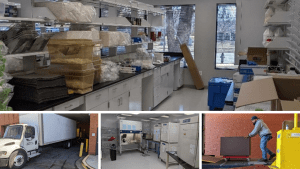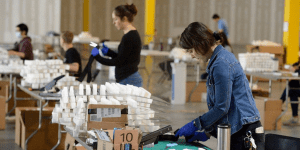
Johns Hopkins Technology Ventures Boosts Maryland Life Sciences
Johns Hopkins Technology Ventures (JHTV) has had a significant impact on the Maryland life sciences ecosystem since its founding in 2014, assisting with hundreds of licensed therapeutics in development and backing nearly 200 startups that have collectively nearly $3 billion in venture capital funding, 30% of which has remained in the state.
During the Maryland Life Sciences Advisory Board’s quarterly meeting in June, Christy Wyskiel, JHTV’s executive director, outlined some of the ways the Johns Hopkins University division has supported startups and commercialization efforts. JHTV aims to help Johns Hopkins faculty turn their discoveries into marketable products and services that can benefit society. This spirit of innovation creates a vibrant entrepreneurial ecosystem at Johns Hopkins that in turn helps the university attract and retain talent, Wyskiel said.
JHTV has three parts, each helping faculty commercialize their work differently. One part is focused on corporate partnerships, helping faculty collaborate with on research with companies such as AbbVie, AstraZeneca, Genentech, Takeda, Bayer, Bristol Myers Squibb, Janssen, and Sanofi.
The other two divisions include technology transfer, which assists in licensing and patent protection, and the FastForward accelerator, which offers startups mentorship, workspace, and professional services, as well as funding opportunities. Companies such as Sonavex, LifeSprout, Thrive, Protenus, and Sonavi Labs have received JHTV’s support.
Sashank Reddy, JHTV’s medical director, advises aspiring entrepreneurs and can personally speak to the benefits of working with the university’s commercialization arm, having co-founded LifeSprout, a regenerative medicine startup.
“We’re in the clinic with our first programs for regenerative medicine. None of that would have been possible without JHTV, particularly the FastForward mentorships,” he said.
JHTV was founded in response to a university report on how it could strengthen its innovation ecosystem. The results have been immediate and dramatic: Between 2010 and 2014, Johns Hopkins’ commercialization efforts brought about $500 million into Maryland, with approximately 15% of the proceeds remaining within the state, Wyskiel said.
From 2015 to 2021, JHTV helped raise $2.9 billion in venture funding, with approximately 30% remained within the state. The funding helped create more than 1,300 new jobs in Maryland. It brought to the state some of the top venture capital firms specializing in life sciences and biotech, including 5 am, Blackstone, Deerfield, Flagship Pioneers, Orbimed, RA Capital, Foresite Capital, and Pfizer Venture Investments.
While financing has been on the rise, Wyskiel said there are still some significant needs to foster a growing startup ecosystem, particularly a dire need in the Baltimore area for laboratory space.
“There’s little remaining space in Baltimore for these companies to expand. That’s a real risk, as companies could look outside of the state,” Wyskiel said.
Another need is for good leadership training programs. Reddy said smaller-scale companies face a challenge in attracting C-suite-level employees. Both Reddy and Wyskiel called for a focus on attracting and training executive talent to retain them. Laying that groundwork will only raise the profile of Maryland as a key life sciences hub in the global economy, they said. Reddy pointed to the innovation district in Cambridge, Massachusetts, that has become the East Coast biopharma hub as a potential blueprint.
“Kendall Square is thought to be the epicenter of pharma innovation. Twenty-five years ago, that was an industrial wasteland. There’s no reason a boom like that can’t happen here,” he said.





